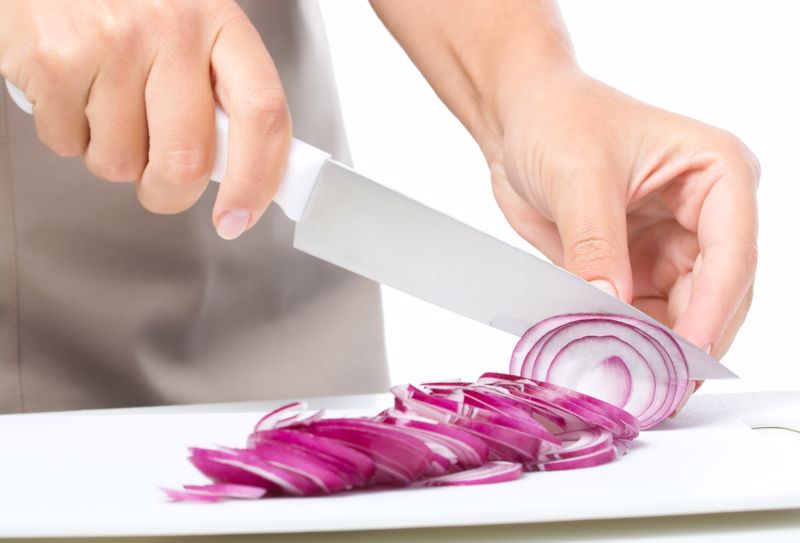Everyone likes lip-smacking delicious food, but it’s safe to say that no one likes bad breath — whether you’re the giver or the receiver. Foul smelling and a major turnoff to whomever you speak, bad breath is caused by a variety of circumstances, frequently related to what you just ate and the food particles that remain on your teeth and gums. While vigorous brushing and flossing do help to stanch the stench, most of us don’t spend our days a few steps away from our bathroom cabinets.
Given this fact, it’s helpful to know which foods contribute to bad breath (or halitosis, its technical term) so you can steer clear of them during meals to avoid offending your friends, co-workers and acquaintances.
Here are a few of them. As you’ll see, many of them are really great for your body, but not so great for your breath:
1. Garlic
There are few more inviting, appetite-inducing scents than fresh garlic minced on countertops or sauteed on stovetops. Your digestive system likes it as well — as does your immune system — but before it makes it there, lots of different chemical processes are occurring in your mouth. Garlic is very high in sulfur, a chemical that is known for many different properties, but perhaps most especially its uniquely potent scent. The aggressiveness of sulfur’s scent is what allows it to linger for as long as it does, as you can probably still taste the flavour of garlic long after you’ve had a bowl of spaghetti or caesar salad.
Not only does sulfur linger longer in your mouth, it also has the ability to enter your bloodstream, to the point where eating large quantities of garlic can make your entire body reek of it.
2. Onion
Yet another food that’s good for you but not your breath is onions. Onion is similar to garlic in a number of ways, in that it’s found in many dishes and it’s a bulb vegetable. It also has many similarities botanically.
From a stinky breath standpoint, much like garlic, sulfur is the main component responsible. It lingers, can enter the bloodstream and the gases it emits exit through the lungs. This is another reason why onion — raw or cooked — is such an all-encompassing aroma.

3. Canned tuna
When you pop open a tin of canned tuna for lunch or dinner, it doesn’t take long for the entire room to smell like the fish as well. But if you’ve ever smelled fresh tuna in a market, then you know it isn’t this particular species that is off-putting. It’s what happens when tuna is placed in a can that’s the problem. Canning tuna expedites the oxidation process, which is naturally occurring but nonetheless the main cause of its aggressive odour. And because tuna is wet, finely minced (or shredded) and sticky when mixed with mayonnaise, it clings to the teeth with ease and stays there until you actively remove it.
4. Dairy
Aside from certain food additives or staple crops (like wheat), dairy products are a well-represented food group in the average person’s diet. From yogurts to milk to butter and whipped cream, dairy is ubiquitous and chock-full of healthy nutrients like calcium, vitamin A, potassium, zinc and protein. Just an 8-ounce glass of milk has as many grams of muscle-building protein.
If only dairy did for your body what it does for your breath. The bacteria that’s on your tongue winds up feeding on the building blocks of protein: amino acids. The result is stinky breath.
5. Sugar
Yes, it’s incredibly delicious and yes it’s found in a lot of foods, drinks and even sauces. But sugar just may be the biggest self-inflicted detriment to your oral health. In addition to being a leading contributor to tooth decay and cavities, sugar is a magnet for bacteria and fuels the processes and acids that contribute to halitosis. There’s a reason why chewing gum — at least the effective kind — contains Xylitol as a sweetener and not sugar.
If you can, be careful about eating foods that contain high amounts of sugar. They aren’t just desserts, either. Sugar is found in many savoury dishes and condiments, like salad dressings, sauces, ketchup, barbecue sauce, salsa and bread.
When brushing and flossing aren’t possible or can’t avoid eating a meal that contains any of these foods or ingredients, there are a few simple things you can do to neutralise those offensive odours:
- If it’s available, chew on a sprig of fresh parsley.
- Chew sugarless gum.
- Drink plenty of water.
- If available, chew on cloves.
Another useful way to minimise bad breath? Scheduling regular dental checkups. If you’re due for one, City Dentists wants to hear from you. Please contact us today to book an appointment online.